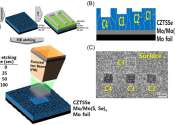Growing strained crystals could improve performance of perovskite electronics
A new method could enable researchers to fabricate more efficient and longer lasting perovskite solar cells, LEDs and photodetectors. By growing thin perovskite films on substrates with different compositions, engineers at ...
Jan 9, 2020
0
2






